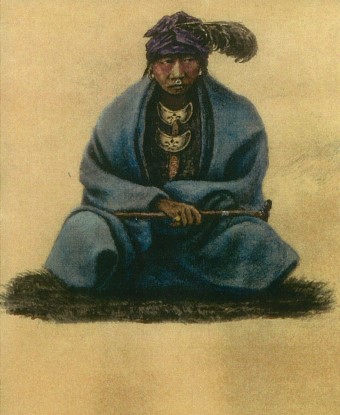Last updated: September 24, 2020
Person
Shingas

Fred Threlfell
Shingas, a Turkey clan Delaware, was both a renowned warrior and a tender family man. In 1752 he was chosen as the spokesperson of the Delaware nation in a treaty ceremony at Logstown (Ambridge, PA). The British colonists recognized this by calling him a king.
On George Washington’s 1753 trip to deliver a message to the French he stopped at Shingas’s village to invite the Delaware chief to join him and other chiefs in Logstown. Shingas attended with Washington. Shortly after that Shingas joined with other chiefs to request that the British build a “strong house” to protect the Forks of the Ohio (Pittsburgh, PA) and his people from the French.
Shingas’s pro-British stance changed after an encounter with General Edward Braddock in 1755. Before joining Braddock’s army in their campaign to gain control of the Ohio River Valley Shingas and five other chiefs questioned Braddock on what he intended to do with the land once the French and their American Indian allies were driven off. To which Braddock replied, the “English Shoud Inhabit & Inherit the Land.” Shingas asked, “whether the Indians that were Friends to the English might not be Permitted to Live and Trade Among the English and have Hunting Ground sufficient to Support themselves and Familys.” Braddock responded, “No Savage Should Inherit the Land.” Hoping that Braddock might have changed his mind Shingas and the other chiefs asked him the same question the next day and Braddock made the same answer. The chiefs said they would not fight with Braddock. Braddock answered, “that he did not need their Help and had No doubt of driveing the French and their Indians away.
The chiefs communicated this exchange to their people. Many were enraged and immediately joined the French. Others waited to see what happened between Braddock’s army and the French. When Braddock was defeated the French pressed the local warriors into joining them and attacking the British settlements.
Shingas became will know for his brutal attacks on frontier settles. Both Virginia and Pennsylvania put a bounty on his head. A missionary, John Heckewelder wrote, “Were all his war exploits on record they would form an interesting document, though a shocking one. … settlements along the frontier felt his strong arm sufficiently to know he was a bloody warrior… in point of courage, activity and savage prowess he was said to never have been exceeded by anyone.
However, Heckewelder also saw another side of the man. One day he watched two captive boys Shingas had adopted playing with Shingas’s own children. Shingas said he treated all the children on an equal footing and they were “alike dear to him.” Another missionary, Christian Frederick Post, wrote that in his community Shingas was “considerate, generous and capable of the warmest personal attachments.
In 1759 Shingas agreed to the terms of the Treaty of Easton including agreeing not to fight with the French. In that treaty the British promised that they would not settle west of the Allegheny Mountains. There was relative peace on the frontier until Pontac’s Rebellion. In July of 1763 Shingas participated in the siege of Fort Pitt. He died that winter.
Throughout his life Shingas tried to do what was best for his nation and the people that depended upon him.
